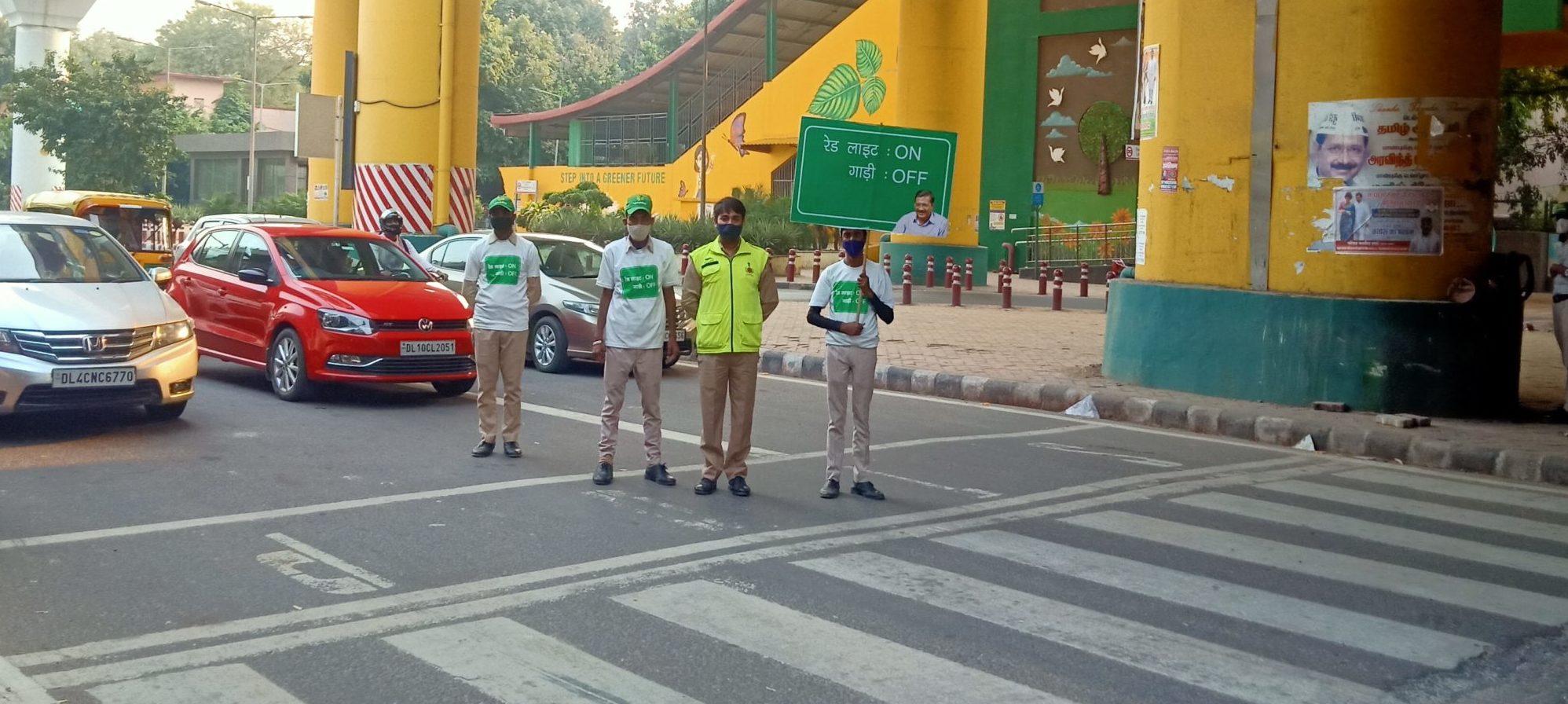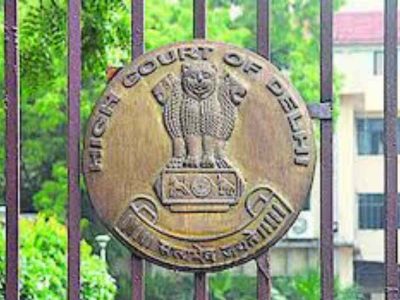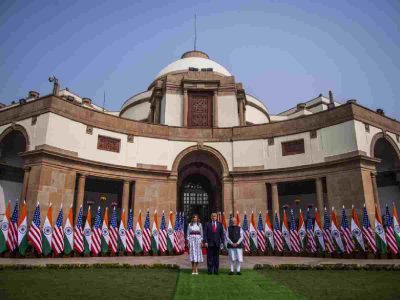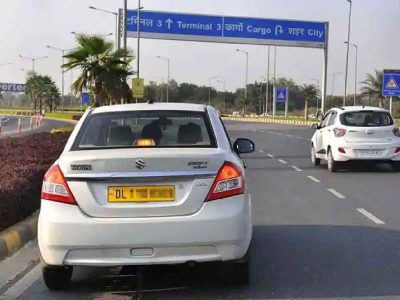Despite being an important part of implementation of campaigns in the city, Delhi’s Civil Defense Volunteers often work without limelight or job security
Kuldeep Rakesh guides his team of seven Civil Defence Volunteers (CDV) to spread and hold a placard which says, “Red Light On, Engine Off”. Rakesh is leading a team of 19 volunteers at a red light near Africa Avenue, Safdarjung enclave to encourage people to switch off their vehicle’s engines at the red lights. They are part of Delhi CM, Arvind Kejriwal’s new anti-pollution campaign across 100 traffic crossings to reduce vehicular emissions.
Delhi’s environment Minister Gopal Rai while launching this initiative said, “To reduce vehicular pollution, the Delhi government has started a ‘Red Light On, Gaadi Off’ campaign from today (Monday). Data by the Petroleum Conservation Research Association (PCRA) shows that if people follow the exercise of switching off engines at traffic signals, pollution can be cut down by 13-20%.”
Rai said that the society and government need to fight together to win this fight against pollution. “I call upon the two crore people of Delhi. This entire campaign is on your shoulders. We are confident that the way we are running the anti-dust campaign in Delhi, we will also see success similarly with this campaign,” he said in the statement.
CDVs hand out pamphlets carrying information on Chief Minister Kejriwal’s three appeals to the people — to actively participate in the campaign, avoid using their cars at least one day a week, and report any case of violation of pollution norms on the Green Delhi app.
Kuldeep Rakesh thinks that this will encourage people to be part of Delhi government’s anti- pollution drive, “This is volunteer work, we can’t force people, we can just encourage them to turn off their engine”.
“My shift here starts at 2 pm, we first go and report at the Jamnagar head office, which is our headquarters, then come for our duty. We can’t leave until we finish our eight-hour shift.” Rakesh and his team will be working for around 23 days on the same signal.
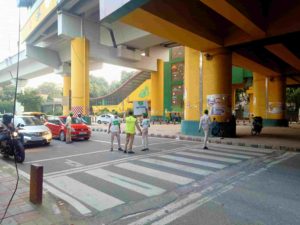
As many as 2,500 Civil Defence volunteers, working in two shifts, have been deployed for the campaign — the morning shift goes from 8 am to 2 pm, and the evening shift from 2 pm to 8 pm. “Around 10 volunteers each will be deployed at 90 intersections of Delhi and 20 environmental marshals each will be deployed at the 10 major intersections of the city,” Rai said.
When air quality starts to deteriorate, work for these volunteers becomes a lot tougher. In the last three days, the Air Quality Index or AQI hit the “severe” category in Delhi, and nearby cities – Gurgaon, Ghaziabad, Noida, Faridabad. It was worst in Gurgaon (460), followed by Ghaziabad (458), Noida (455), Faridabad (449). Delhi’s AQI stood at 436.
Aditya, a civil defence volunteer working under Kuldeep says that despite the pollution they can’t say no to this work. “We got this work after four months. We were sitting idle this whole time. We had nothing. We were earlier deployed in containment zones. This work is only for one month. We are not sure whether we will get work again or not. So, despite pollution and everything we have to do our duty.”
Volunteers come from various corners of Delhi by public transport to their workplace, “We travel in public transport and come here. We arrange our food and everything.” said Vijay, another volunteer. “We haven’t been paid salaries for the work we had done at the containment zone. When we ask, the official response is that they don’t have funds and we will be given salaries whenever funds come.”
CDVs are paid Rs 783 per day. “This work at least pays a good salary. Otherwise, it’s hard to even get a job that pays six or seven thousand. So, we do it.”
“We are victims of unemployment. We all are graduates and are doing this because we don’t have other work to do. We have responsibilities for our family, and can’t afford to be unemployed at all. Whether it is pollution, delayed salaries or anything we have to manage everything because that’s what is required from us to be in this job.”
CDVs were commended for their work during Covid- 19. But they came into notice for the first time in 2016 when the odd/even scheme was implemented. They were also deployed in public bushes as marshals for the security of women. The interesting aspect of CDVs is their khaki uniform — belts, shoulder loops, arm patches, lanyards which makes them a subject of attention, and also impart a sense of power.
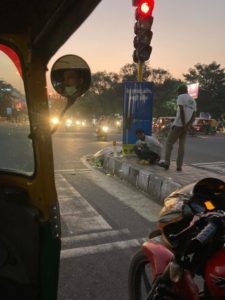
Who are Civil Defence volunteers?
CDVs are governed by the Civil Defence Act, 1968. Civil defence is defined as any measure “not amounting to actual combat, that protects persons, property and places in India from hostile attack”. Their basic role is to assist the local administration.
The act was amended several times, the latest amendment in 2010, added disaster management as one of their duties when they can be called for service. When the centre invoked disaster management act, the volunteers assumed the role of frontline workers — participating in screening hotspots and distributing rations for the needy. They were deployed at testing centres, markets to maintain social distancing and also enforcing the mask rules in Delhi.
The Directorate of Civil Defence in Delhi was carved out of the Directorate of Home Guards by a notification in 2009 of lieutenant governor. Across 11 districts in the city the Directorate of Civil Defence has 162 sub-divisions.
CDVs have become an important part of governance in Delhi for the last few years. Therefore, Delhiites find these volunteers at various places especially since Covid. But, there have been complaints during Covid enforcement that they penalize people and there have been cases of extortion and violence against CDVs.
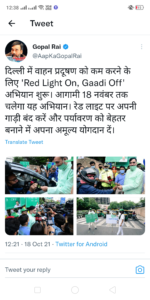
Considering these allegations of illegal challans, issued by Civil Defence volunteers, Delhi police issued a detailed statement in April stating that they can’t issue challans. There were in fact demands to change the uniform of CDVs to offset confusions. Delhi BJP spokesperson Praveen Shankar Kapoor wrote a letter to Lt Governor Anil Baijal, stating that CDVs are harassing people and their uniform should be changed.
“The wearing of khaki uniform by these Civil Defence Volunteers is under question with complaints of these volunteers exceeding their Covid duty and being involved in extortion. I therefore demand that you order an inquiry into the process of enrolment of Civil Defence Volunteers and their duty deployment, and also order a change of their dress color from khaki to some other color which does not resemble police or defence service,” Kapoor wrote.
CDVs also face public ire when people realise that they don’t have any enforcement power. Nitesh, who asks people to get RT- PCR in a Metro station says, “People are ready to beat us, when we ask them to come and get tested. We are under pressure to collect samples. When we try to talk to people, they start abusing us because we can’t force anyone. We are just doing our duty, which is to encourage as many people as possible for tests, as the government needs samples to keep a check on Covid cases.”
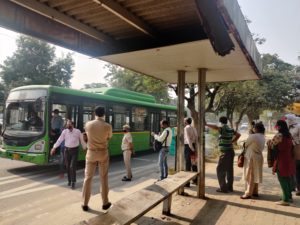
For recruitment, volunteers are called out from time to time on a need basis. Anyone above 18 years of age and primary level of education can apply. Preference is given to people who passed class 8 and are citizens of India, Nepal, or Bhutan can apply. But it is not mandatory. People with higher qualifications can also apply.
However, volunteers are not employees. They can be called out at any time and can be fired. They have no social security, no benefits other than their salary. “I have been working for more than a year now. At least we should be paid our salaries on time. We know that the government won’t steal our salary but the delay for months is disheartening and we are working in pollution during the festive season,” says Rakesh.
(Cover: Civil Defense Volunteers have been deployed at various intersections across the city to raise awareness about and ask commuters to switch off their vehicle’s engines at red lights PHOTO: Myank Jain Parichha)

